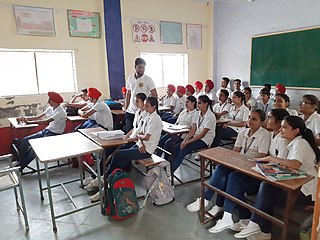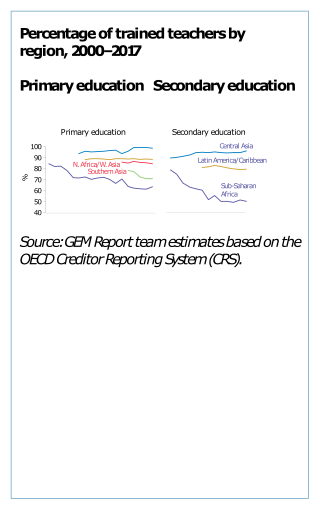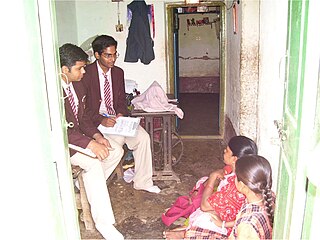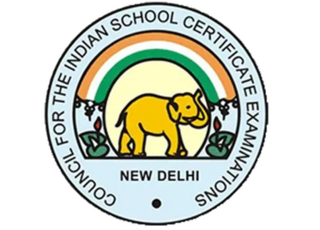
Education in India is primarily managed by the state-run public education system, which falls under the command of the government at three levels: central, state and local. Under various articles of the Indian Constitution and the Right of Children to Free and Compulsory Education Act, 2009, free and compulsory education is provided as a fundamental right to children aged 6 to 14. The approximate ratio of the total number of public schools to private schools in India is 10:3.
Minimally invasive education (MIE) is a form of learning in which children operate in unsupervised environments. The methodology arose from an experiment done by Sugata Mitra while at NIIT in 1999, often called The Hole in the Wall, which has since gone on to become a significant project with the formation of Hole in the Wall Education Limited (HiWEL), a cooperative effort between NIIT and the International Finance Corporation, employed in some 300 'learning stations', covering some 300,000 children in India and several African countries.
The Indian Certificate of Secondary Education (ICSE) is an examination conducted by the Council for the Indian School Certificate Examinations, a private board designed to provide an examination in a course of general education, in accordance with the recommendations of the New Education Policy 2020 (India), through the medium of English. The examination allows secure suitable representations of responsible schools in their states or territories.

Rishi Valley School is an Indian boarding school, founded by the philosopher Jiddu Krishnamurti. The school has a holistic approach to education in the spirit of Krishnamurti's pedagogical vision. Community service and extracurricular activities are part of the students' schooling, as are discussions, assemblies and club meetings.

Teacher education or teacher training refers to programs, policies, procedures, and provision designed to equip (prospective) teachers with the knowledge, attitudes, behaviors, approaches, methodologies and skills they require to perform their tasks effectively in the classroom, school, and wider community. The professionals who engage in training the prospective teachers are called teacher educators.

Inventure Academy is a private coeducational International School in Bangalore, India. It is located on the Whitefield-Sarjapura road on the Eastern periphery of Bangalore city and has a campus of over 20 acres.
Eklavya is an Indian NGO based in Bhopal, Madhya Pradesh working in the field of education. It was registered as an all India in 1982. The organization is named after Eklavya, the protagonist of a story in the Mahabharat, for his determination to learn even in the absence of a teacher.
The Secondary School Leaving Certificate is a certification obtained by a student on successful completion of an examination at the end of study at the secondary schooling level in India. The SSLC is obtained on passing the grade 10 public examination, which is commonly referred to as 'class 10 board examinations' in India. SSLC is a common eligibility examination popular in many states in India, especially Kerala, Karnataka, and Tamil Nadu. The SSLC is also called Secondary School Certificate (SSC) in Andhra Pradesh, Telangana, Maharashtra and also as High School Certificate (HSC) in Madhya Pradesh and also as Matriculation in many states of India.

Vidya Bharati is the educational wing of Rashtriya Swayamsevak Sangh (RSS). It runs one of the largest private network of schools in India, operating 12,000 schools with over 3.2 Million students, as of 2016 and has its registered headquarters in Lucknow with a functional headquarters in Delhi and a sub-office in Kurukshetra. In the year 2020, the million lives club selected Vidya Bharati as an official member of Vanguard cohort for its contribution to school education.

The Visakha Valley School is a school situated in Visakhapatnam, Andhra Pradesh, India. It is one of oldest schools in the city of Visakhapatnam.
Agastya International Foundation (Agastya) is an Indian education trust and non-profit organization based in Bangalore, India whose mission is "to spark curiosity, nurture creativity and instil confidence" among economically disadvantaged children and teachers in India. A team of scientists, educators, and entrepreneurs led by Ramji Raghavan founded Agastya in 1999. Agastya's founders include the late K.V. Raghavan, former chairman of Engineers India Limited and Dr. P.K. Iyengar, former chairman of the Indian Atomic Energy Commission. Agastya runs hands-on science and art education programs in rural, semi-urban, and urban regions across 19 Indian states. It is one of the world's largest mobile and hands-on science education programs catering to economically disadvantaged children and public-school teachers.
All India Secondary School Examination, commonly known as the class 10th board exam, is a centralized public examination that students in schools affiliated with the Central Board of Secondary Education, primarily in India but also in other Indian-patterned schools affiliated to the CBSE across the world, taken at the end of class 10. The board conducts the examination during the period of February–March. Previously it was taken in March to April every year. In this exam, mathematics, science, and social science are compulsory, with any two languages. Students can also opt skill subject such as information technology, painting, yoga, music or artificial intelligence. Successful candidates are awarded the Secondary School Completion Certificate, a statement of marks, and a migration certificate stating that the candidate has completed secondary schooling and can pursue higher education. For the academic year 2016–17, the Central Board of Secondary Education has revived the old system of syllabus and marking scheme (complete syllabus for All India Secondary School Examination and marks out of 500. India has state exams and central exams.

Activity-based learning, or ABL, describes a range of pedagogical approaches to teaching. Its core premises include the requirement that learning should be based on doing hands-on experiments and activities. Activity-based learning is rooted in the idea that children are active learners rather than passive recipients of information. If children are provided the opportunity to explore on their own and are provided with an optimum learning environment, then learning becomes more joyful and long-lasting.
Education is based on three-tier model which includes primary schools, followed by secondary schools and tertiary education at universities or other institutes of same level. Education Department of the Government of Delhi is a premier body which looks into the educational affairs. The RTE right to education states that children from the age of 6 to 14 have to compulsorily be educated. 25% of the seats in all private schools are also reserved for the under-privileged children. Tertiary education is administrated by the Directorate of Higher Education.

Socially Useful Productive Work (SUPW) is a "purposive productive work and services related to the needs of the child and the community, which will be proved meaningful to the learner. Such work must not be performed mechanically but must include planning, analysis and detailed preparation, at every stage so that it is educational. Adoption of improved tools and materials, where available and the adoption of modern techniques will lead to an appreciation of the needs of a progressive society based on technology." Students learn to work as a team, with skill and deftness. It was introduced in 1978, by the Ministry of Education in India to promote Gandhian values and educational ideas of Mahatma Gandhi.

In the United States, elementary schools are the main point of delivery of primary education, for children between the ages of 4–11 and coming between pre-kindergarten and secondary education.

The Council for the Indian School Certificate Examinations (CISCE) is a non-governmental privately held national-level board of school education in India that conducts the Indian Certificate of Secondary Education (ICSE) Examination for Class X and the Indian School Certificate (ISC) for Class XII.
Avalon Heights International School is a coeducational secondary school located in Vashi, Navi Mumbai. It is affiliated to the Indian Certificate of Secondary Education (ICSE) and was established in 1998. The school has over 1200 students and is located near APMC Market in Navi Mumbai.

Sri Gowthami Degree and PG College is a pioneering Under graduate and Post Graduate College at Darsi in Prakasam district, Andhra Pradesh, South India. It is the first college among the group of Sri Gowthami Educational Institutions (SGEIs) in Prakasam district, Andhra Pradesh State, established by the educationalist and social activist, Kanumarla Gunda Reddy in the year 2000. It is being managed and run by Sri Gowthami Urban and Rural Integrated Development and Educational Society.

Carmel School Madhupur is a private convent school located in the town of Madhupur in the Deoghar district of Jharkhand, India. It is a fully-fledged co-educational, day school affiliated to Council for the Indian School Certificate Examinations (CISCE), New Delhi and offers education to students from Grade LKG to Grade X. The medium of instruction for all classes is English. The school provides a hostel for girls. The boys attend the school as day scholars. The students of Carmel School are referred to as Carmelites.













